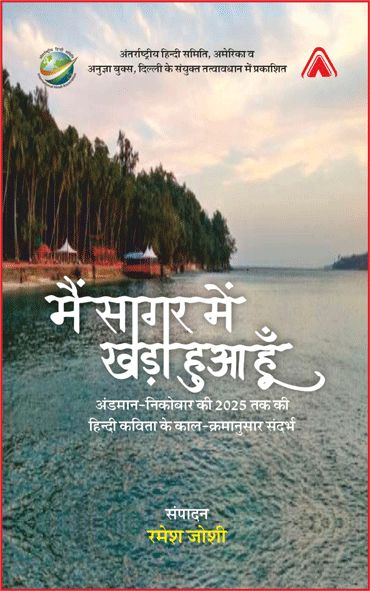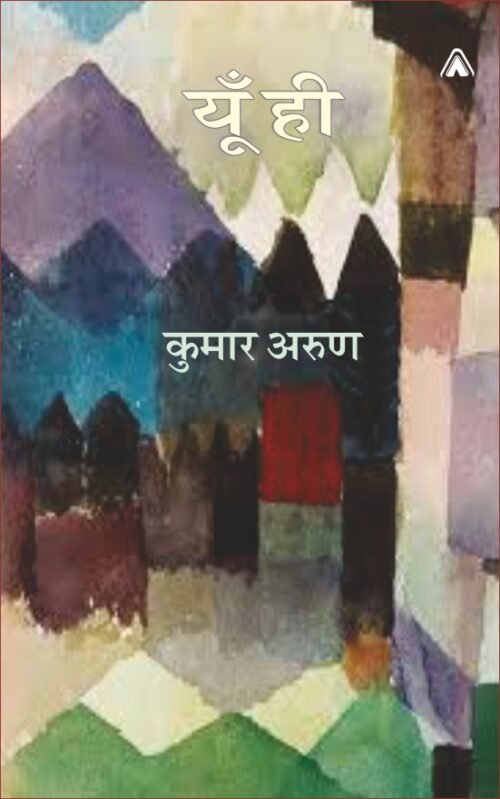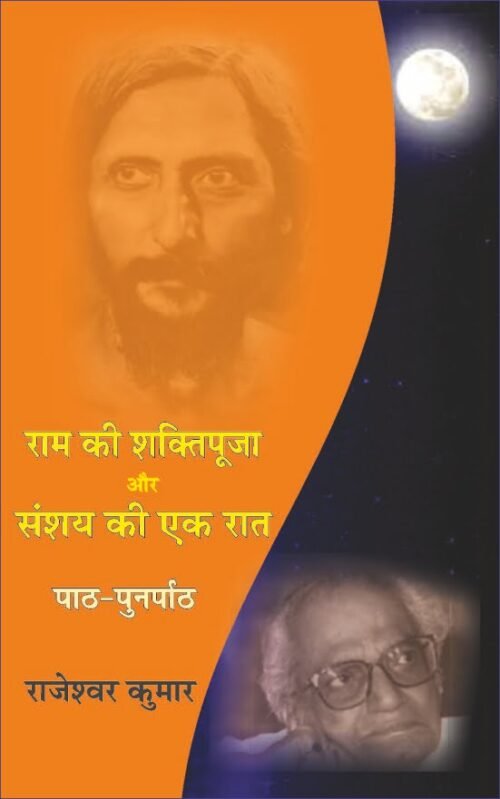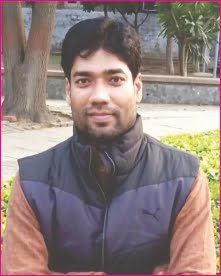



Mein Sagar Mein kahada Huva Hoon / मैं सागर में खड़ा हुआ हूँ (अंडमान-निकोबार की 2025 तक की हिन्दी कविता के काल-क्रमानुसार संदर्भ)
₹500.00
Read eBook in Mobile APP
Amazon : Buy Link
Flipkart : Buy Link
Kindle : Buy Link
NotNul : Buy Link
इस संचयन में मुझे अनेक पूर्ववर्ती साहित्यप्रेमियों के प्रयासों से सहायता मिली है यथा सुरेशनंदन प्रसाद सिन्हा ‘नीलकंठ’ के संकलन अंडमान के हिन्दी कवि, नव परिमल से 1979 में प्रकाशित संकलन ‘कृति’, 2001 में प्रकाशित मदन मोहन सिंह द्वारा संपादित ‘द्वीपांजलि’, 2004 और 2023 में डॉ. व्यासमणि त्रिपाठी द्वारा संपादित संकलनों अंडमान के हिन्दी कवि और हिन्दी कविता में अंडमान और हिन्दी साहित्य कला परिषद द्वारा प्रकाशित पत्रिका द्वीप लहरी के पुराने अंक। इनके अतिरिक्त परिषद के पुराने युवा साथी जगदीश नारायण राय, कैम्बल बे में श्रीकांत उपाध्याय की शिष्या रही रेणुबाला और ‘दायरा-ए-उर्दू अदब’ के संस्थापक जनाब इलियास अहमद खान के भी अपने संपर्कों का लाभ खुले दिल से मिला और पंडित विजय बहादुर जी तथा राधाकिशन जी के फ़ोटो जुटाकर तो मेरे शिष्य संजय मल्होत्रा ने कमाल ही कर दिया।
द्वीपों में कई तरह के लोग जुड़े हैं जैसे द्वीपों में सबसे पहले से बसे नीग्रो और मंगोल नस्ल के समुदाय, ब्रिटिश शासन द्वारा विभिन्न रूपों में लाए गए लोग, यहाँ नौकरी-व्यवसाय के लिए आये लोग और मौज मजे के लिए, फ़ोटो खिंचवाने और मित्रों से उसे शेयर करके खुश होने वाले लोग। इनमें ऐसे भी लोग रहे जिन्होंने यहाँ से छूटने के बाद कभी इधर का रुख नहीं किया, कुछ अभी भी अंडमान की मधुर यादें अपने दिल में सँजोये देश-दुनिया में फैले हैं। लेकिन सबसे धन्य वे हैं जिन्होंने लौटने का विकल्प होते हुए भी इसे अपना घर बनाया, यहाँ के मिट्टी-पानी में मिल गए।
उन्हीं लोगों ने भारत के ख्वाब को ताबीर किया है, वैकुंठ बनाया है।
यह कविताओं का संकलन मात्र नहीं है बल्कि एक शताब्दी में द्वीपों से जुड़े लोगों की वैचारिक दुनिया के अपने काल खंड की एक साहित्यिक, वैचारिक तस्वीर है जो अपने हिसाब से एक इतिहास है, संदर्भ है। हर काल का इतिहास इसी तरह लिखा जाता है। राजाओं के इतिहास में तिथियाँ सच होती हैं जबकि साहित्य में जीवन होता है। साथ जीने का आनंद होता है और उसके संघर्ष होते हैं।
राजनीति प्रपंच रचती है और जीवन सहयात्रा और सहयोग से विश्वास की नींव रखता है। उसी नींव पर खड़ा है यह द्वीप समूह और कहता है–
ऐसे नहीं उखड़ने वाला
ऐसे नहीं उजड़ने वाला
मैं अनंत के अंतस्तल में
बहुत दूर तक गड़ा हुआ हूँ।
मैं सागर में खड़ा हुआ हूँ।
व्यक्तिगत रूप से द्वीपों ने मुझे बेहतर इंसान बनाया है, मेरी कुंठाओं को कम किया है। मैं कृतज्ञ हूँ द्वीपों का। और उसी कृतज्ञता का एक छोटा-सा उपक्रम है यह संकलन।
त्वदीय वस्तु गोविंदम् …..
- Description
- Additional information
Description
क्रम
- काला पानी : उजली यादें
- पंडित विजय बहादुर
- पंडित राधाकिशन
- डॉ. सरोज कान्त झा
- एन० चन्द्र० ‘नवीन’
- राजेन्द्र प्रताप सिंह
- ओमप्रकाश वर्मा
- नरेंद्र नागर ‘पागल’
- उमेश प्रसाद
- सुरेश नंदन प्रसाद सिन्हा ‘नीलकंठ’
- सी० डी० इलियास ‘कुन्दन’
- राजनारायण बिसारिया
- मद्दाल सत्यनारायण मूर्ति
- मोहम्मद शोएब शम्स
- लेखराज कपूर
- आनन्द वल्लभ शर्मा ‘सरोज’
- मदनमोहन सिन्हा ‘मनुज’
- श्रीकांत उपाध्याय
- शकुंतला शिवराम
- इलियास अहमद खान ‘हमसर’
- निर्मल कुमार श्रीवास्तव
- शारदा राम
- ईश्वरी प्रसाद गौड़
- जंगबहादुर सिंह ‘भ्रमर’
- गीता कृष्णात्री ‘दीपशिखा’
- विनोद तिवारी
- रमेश जोशी
- लाखन सिंह कुशवाह
- सेवाराम सेतिया
- अमरजीत कौर सेतिया
- कपिल देव शुक्ल
- बालमुकुंद शर्मा थपलियाल
- राज अण्डमानी
- श्रीनिवास शर्मा
- सुमन सिंह
- डॉ. गोविंद सिंह पँवार
- अजयकुमार सिंह
- सोहन सिंह
- राजेन्द्र यादव ‘प्रसून’
- डॉ. भगवान स्वरूप चैतन्य
- डॉ. संत प्रसाद राय
- विजय कुमार शर्मा
- अशोक श्रीवास्तव ‘अशोक’
- मनजीतसिंह ‘आज़ाद’
- डॉ. आकुल
- अवधेश कुमार तिवारी
- कृष्ण कुमार ‘विश्वेन्द्र’
- मंगत राम
- जय बहादुर शर्मा
- ब्रजेन्द्र कुमार मिश्र
- लीलाधर मंडलोई
- सकीना सिराज
- जगदीश नारायण राय
- रामप्रसाद ‘निर्दोष’
- नूरुल इकराम खान ‘नूर’
- राजेश कुमार ‘निराश’
- दुर्गविजय सिंह ‘दीप’
- अनिरुद्ध कुमार त्रिपाठी
- विजय कुमार मलिक
- अनस्तासिया
- राम कृपाल तिवारी
- श्रीधरन ‘चंद्र’
- डी एम सावित्री
- उषा शर्मा चंद्रिका
- डॉ. रोशनआरा ‘दिलबर’
- डॉ. व्यास मणि त्रिपाठी
- गोविंद राम
- राजेश कुमारी
- हरिश्चंद्र राय
- रेणुबाला
- मोहम्मद ईसा ‘ईसा’
- मकसूद आलम
- डॉ. रशीदा इक़बाल ‘सना’
- डॉ. मंजू नायर
- बासु कुमार
- श्रीकांत जोशी
- कृष्ण देव शुक्ल
- शशिकांत जोशी
- अनिरुद्ध कुमार पांडेय
- जतरू बड़ाइक
- डी. आदिलक्ष्मी
- अरविन्द जोशी
- हरिनाथ शुक्ल
- इशरत परवीन
- सोनी सोलोमन
- डॉ. एन. लक्ष्मी “प्रिया”
- कृष्ण कुमार यादव
- कँवर चंद्रदीप सिंह
- आकांक्षा यादव
- डॉ. नीता समद्दार
- सुमीत राम
- डॉ स्कोलस्टिका
- तृप्ति चौबे
- रूना लैला खातून
- श्वेता कंडुलना रिम्शा
- सेफाली दत्ता
- सुनयना लाकड़ा
- लक्ष्मी कुमारी
- शिखा द्विवेदी
- कुनाल बाइन
- आयुष दुबे ‘कनक’
- महक
- बी उदय किरन
Additional information
| Weight | N/A |
|---|---|
| Dimensions | N/A |
| Product Options / Binding Type |








